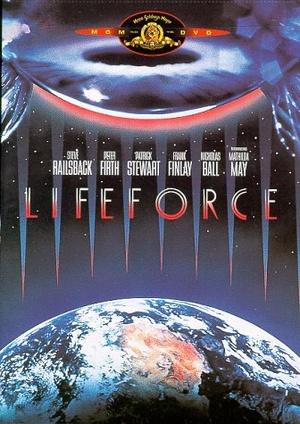Home > Movie Reviews > Lifeforce
Tobe Hooper's 1985 film Lifeforce is based on a Colin Wilson novel, The Space Vampires. In "How To Write Tales Of Horror, Fantasy & Science Fiction", Colin Wilson has an article that starts by discussing his novel and comparing it with Tobe Hooper's adaptation. Specifically, he calls Lifeforce "a textbook example of how to make a bad movie". He praises the entire production team, but apparently the distributor decided it was thirty minutes too long and cut that much build-up from the beginning. Result: wham-bam schlock that jumps straight into the horror without giving the audience a chance to settle down first. (Apparently Japan got the uncut version and there it was a huge success.)
According to the imdb, Colin Wilson exaggerates. Lifeforce's running time is listed as 116 minutes, or 105 minutes for the American edited version. But that's still a pretty significant scissoring and I'm pleased to see that my R2 DVD claims to have a running time of 111 minutes. Taking into account the 25/24 frame PAL speed-up, it looks like I've got the full-length version. Don't watch anything else!
For most of its running time, Lifeforce is pretty faithful to Colin Wilson's novel. It retains character names, plot points and big chunks of dialogue. The big difference comes with the film's final act, which is completely invented by the scriptwriters (Don Jakoby and Dan O'Bannon). Broadly speaking the book wraps itself up with twenty pages of well-mannered discussion and alien revelations, while the movie heads off into a whole new act and goes for something more apocalyptic. Both climaxes are a bit unsatisfactory, the novel's because it's a deus ex machina and the film's because it's "huh?"-inducing, but on reflection I think both work in their own eccentric ways.
However I'm primarily discussing Lifeforce rather than The Space Vampires. Of all the adjectives one might apply to a Tobe Hooper film, I never thought I'd use this one... but Lifeforce is *quaint*. It was made in 1985, but it looks like 1975 and it feels like 1955. (The novel's set around 2080, but the movie thinks it's firmly contemporary. It even shoehorns Halley's Comet into the plot, taking advantage of the fact that in 1985 the comet happened to be passing.) Lifeforce's visuals are utterly seventies: the clothes, the hairstyles, the decor and even that slightly rough-edged look to the cinematography that was current in that decade.
However the feel is utterly fifties. You've got a terror from space wreaking havoc... in England! As London burns and the government topples, English-accented gentlemen discuss their best course of action and occasionally mention the Americans. Me, I was having John Wyndham flashbacks. The astronaut Carlson is on loan from NASA (he's the hero, so he had to have an American accent!) but his acting's so dreadful that you hardly notice him. This is an *English* world-shaking catastrophe, in that parochial fifties tradition. Personally I found it rather refreshing.
Of course no fifties SF film would have this much nudity, but there's something almost innocent about Mathilda May's oft-seen but lovely breasts. Actually The Space Vampires felt much more the work of a dirty old man. Colin Wilson's "vampires" are life-stealers, mentally dominating you in order to drain your energy (or lifeforce). The dodginess involves an odd take on sexuality, in which Colin Wilson speculates about whether all sexual magnetism might involve this kind of energy exchange. When one character develops a psychic link with the vampire girl, he gains the ability to make women throw themselves at him while having multiple orgasms. This involves "male" vs. "female" energy, benevolent vampirism and so on. Lifeforce keeps the bare bones of all this, but spares us Colin Wilson's explanations and so the peculiarities just come over as odd telepathy.
Personally I think the film probably snipped too much of the book's exposition. Admittedly a novelist can get away with info-dumps that in a film would seem unbearably talky, but The Space Vampires is a novel driven by its ideas and they're actually quite intriguing. And more importantly, Lifeforce's ending might have had more emotional impact if we'd had a better idea of the situation.
Someone who hadn't read the book might find Lifeforce a bit of a mish-mash. It begins much like Alien - astronauts check out a space hulk and bring back something bad. It ends like a zombie film, of all unlikely things. It middles (for lack of a better verb) like John Wyndham. It's a bit staid and British. Is there something Tobe Hooper isn't telling us? It has odd failings, e.g. the moving bodies look dreadful, while the movie doesn't seem able to decide whether or not the space hulk is radar-invisible (conveniently forgetting that radar doesn't work in space anyway). And Steve Railsback, playing Carlson, is charmless.
But having said all that, I quite liked it. Every so often it serves up some nice visuals, including one gross effect that comes out of nowhere late in the day. I don't have enough fifties movies in my collection, so I enjoyed its fifties vibe. Mathilda May looks good naked. It's a laugh seeing Patrick Stewart crop up out of nowhere halfway through. The cosmic ending is growing on me. And I think that underneath everything, Lifeforce is telling an interesting story.
It's not perfect. A different director and a different cast might have added that undefinable extra ten per cent that suddenly makes everything chime. Tap Lifeforce with your fork and you'll hear a slightly dull clunk. But it's still a well-meaning and sometimes good-looking film that's not without charm.
